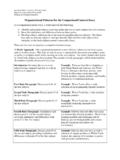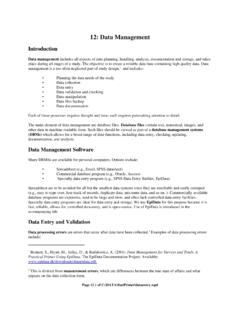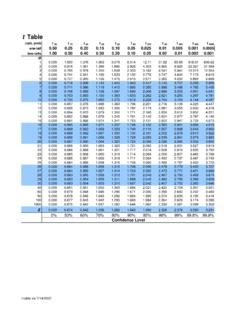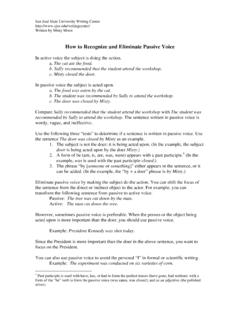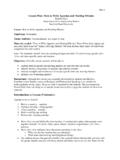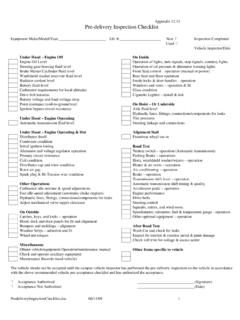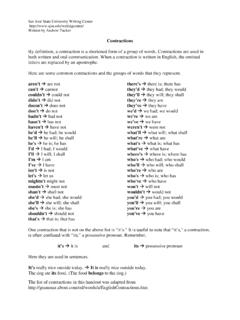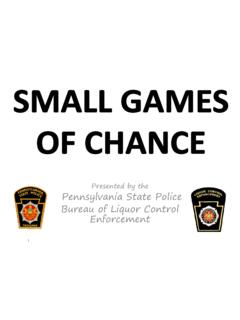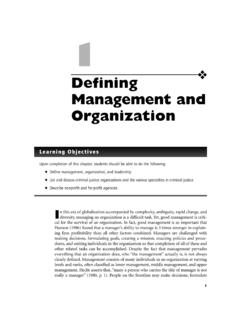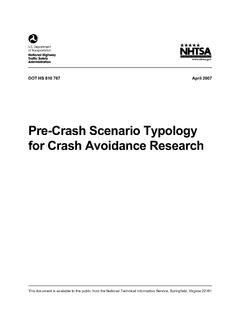Transcription of Police in America - San Jose State University
1 Police in AmericaPolice in AmericaChapter TwoChapter TwoThe History of American The History of American 2011 The McGraw-Hill Companies, Inc. All rights History of American The History of American PolicePoliceThe Relevance of HistoryThe Relevance of History Knowledge of the development of policing Knowledge of the development of policing contributes to our understanding of contributes to our understanding of contemporary practices and practices and problems. Police organization , reforms, and policePolice organization , reforms, and Police --22 Police organization , reforms, and policePolice organization , reforms, and Police --community relations today are deeply rooted in community relations today are deeply rooted in the Relevance of HistoryThe Relevance of HistorynnThe study of Police history can.
2 The study of Police history Dramatize the fact of changeDramatize the fact of Put current problems into perspectivePut current problems into us understand what reforms have Help us understand what reforms have us understand what reforms have Help us understand what reforms have worked and not workedworked and not Alert us to the unintended consequences of Alert us to the unintended consequences of reformsreformsThe English The English HeritageHeritage Formal law enforcement began in 13th CFormal law enforcement began in 13th C Responsibility for Law EnforcementResponsibility for Law Enforcement Constable, Sheriff, & Justice of the Peace, private Constable, Sheriff, & Justice of the Peace, private 44 Constable, Sheriff, & Justice of the Peace, private Constable, Sheriff, & Justice of the Peace, private citizenscitizens Did not work with urbanization and industrializationDid not work with urbanization and industrialization Sir Robert Peel Sir Robert Peel Parliament: London Metropolitan Police (1829)Parliament.
3 London Metropolitan Police (1829) Modern Law EnforcementModern Law Enforcement Mission / Strategy / Organizational StructureMission / Strategy / Organizational StructureLaw Enforcement in Colonial Law Enforcement in Colonial AmericaAmerica SheriffSheriff Appointed by colonial Appointed by colonial governorgovernor Chief local government Chief local government officialofficial Law enforcementLaw enforcement WatchWatchWatchmen patrolled to guard againstWatchmen patrolled to guard againstFireFireCrimeCrimeDisorderDisorde rOriginally, only night watchOriginally, only night watch55 Law enforcementLaw enforcement Collect taxesCollect taxes Conduct electionsConduct elections InfrastructureInfrastructure ConstableConstable Some responsibility for Some responsibility for enforcing law and enforcing law and maintaining ordermaintaining order Originally elected, later Originally elected, later appointedappointedOriginally, only night watchOriginally, only night watchAll males were expected to serveAll males were expected to serve Slave PatrolSlave PatrolDistinctly AmericanDistinctly AmericanGuard against slave revolts and Guard against slave revolts and capture runaway slavescapture runaway slavesnnLaw Enforcement wasLaw Enforcement was Inefficient.
4 DisorganizedInefficient, disorganized PoliticalPoliticalnnInformal Social ControlInformal Social Control Community and citizen Community and citizen enforcementenforcement66 PoliticalPolitical Reactive, not preventativeReactive, not preventative NonNon--investigativeinvestigative Outnumbered, ill equippedOutnumbered, ill equipped HighlyHighlymoralisticmoralistic Laws against drinking, Laws against drinking, gambling and sexual practicesgambling and sexual practices Bribery and corruptionBribery and corruptionenforcementenforcement ChurchChurchnnFrontier/RuralFrontier/Rur al VigilantismVigilantism Mob justiceMob justice LynchingLynchingFirst Modern America PoliceFirst Modern America Policenn1830s1830snnUrbanization, industrialization, immigration, Urbanization, industrialization, immigration, tension between ethnic groups, riots in large tension between ethnic groups, riots in large cities, disregard for the law, moral uprisings and cities, disregard for the law.
5 Moral uprisings and escalating violence escalating violence ----> need for new kind of law > need for new kind of law 77escalating violence escalating violence ----> need for new kind of law > need for new kind of law enforcement enforcement nnAmericans Americans did not trust a standing Police forcedid not trust a standing Police force did not want to pay for it did not want to pay for it feared political influence and corruption feared political influence and corruptionFirst Modern America PoliceFirst Modern America PolicennEnduring Features from UKEnduring Features from UK Beat presence / watch system / patrolBeat presence / watch system / patrol Paramilitary structureParamilitary structure Limited Police AuthorityLimited Police Authority Individual libertyIndividual liberty Local Control Local Control ----> Decentralized and Fragmented / > Decentralized and Fragmented / Uncoordinated SystemUncoordinated System88 Uncoordinated SystemUncoordinated SystemnnNew York New York -- first Police department with a day and night first Police department with a day and night shift (1845)shift (1845)nnDid not wear uniforms but had a hat and badgeDid not wear uniforms but had a hat and badgennDid not carry firearms (not until late 1800s)Did not carry firearms (not until late 1800s)Three Eras of American Three Eras of American PolicingPolicingnnThe Political EraThe Political Era(1830s(1830s--1900)1900) Attractive job.
6 Good $, unchecked power, largely Attractive job: good $, unchecked power, largely unsupervisedunsupervised Inefficient, corrupt, unprofessional, nepotisticInefficient, corrupt, unprofessional, nepotistic No personnel standards, no trainingNo personnel standards, no training99 No personnel standards, no trainingNo personnel standards, no training Foot patrol, no phones, cars or radios Foot patrol, no phones, cars or radios ----> lack of response> lack of response Not respected by publicNot respected by public Brutality, misconductBrutality, misconduct Marked by policeMarked by Police --citizen conflictcitizen conflict High turnoverHigh turnover Began to carry firearms in response to lack of Began to carry firearms in response to lack of control.
7 Increase in crime rates and citizen violencecontrol, increase in crime rates and citizen violence Opposite of UKOpposite of UKPolitical EraPolitical ErannGeorge PlunkittGeorge Plunkitt District Leader for Tammany HallDistrict Leader for Tammany Hall Believed corruption was the essence of democracyBelieved corruption was the essence of democracy Awarded PD jobs to certain people Awarded PD jobs to certain people Funded TH with kickbacks and payoffsFunded TH with kickbacks and payoffs1010 Funded TH with kickbacks and payoffsFunded TH with kickbacks and payoffs Officers were paid not to enforce laws Officers were paid not to enforce laws Why was Police corruption not stopped? Why was Police corruption not stopped?
8 IncentivesIncentivesPolitical EraPolitical ErannNo golden age of policing in AmericaNo golden age of policing in AmericannEssentially ineffectual and corruptEssentially ineffectual and corruptnnEnforcement of the Sunday Closing Law, Enforcement of the Sunday Closing Law, 18821882111118821882nnFailure of Reform (reform continues today)Failure of Reform (reform continues today) Battle for control and oversightBattle for control and oversight Amounted to replacing bad Police with good Amounted to replacing bad Police with good policepolice No substantive ideas about Police administration , No substantive ideas about Police administration , training or standardstraining or standards Theodore RooseveltTheodore RooseveltThe Diary of a Police Officer: The Diary of a Police Officer: Boston, 1895 Boston, 1895 The recently discovered 1895 diary of Boston Police officer The recently discovered 1895 diary of Boston Police officer Stillman S.
9 Stillman S. WakemanWakemanprovides a revealing glimpse into actual Police work 100 provides a revealing glimpse into actual Police work 100 years Wakeman was an officer of the neighborhood. He spent most Officer Wakeman was an officer of the neighborhood. He spent most of his time on patrol responding to little problems that neighborhood of his time on patrol responding to little problems that neighborhood residents brought to him: disputes, minor property crimes, and so residents brought to him: disputes, minor property crimes, and so 1212residents brought to him: disputes, minor property crimes, and so residents brought to him: disputes, minor property crimes, and so on. He spent relatively little time on major offenses: murder, rape, on.
10 He spent relatively little time on major offenses: murder, rape, robbery. He resolved most of the problems informally, acting as a robbery. He resolved most of the problems informally, acting as a neighborhood Wakeman s role was remarkably similar to that of contemporary Officer Wakeman s role was remarkably similar to that of contemporary patrol officers. He was reactive and a problem solver. The major patrol officers. He was reactive and a problem solver. The major difference was the absence of modern Police technology: the patrol difference was the absence of modern Police technology: the patrol car and the 911 telephone and the 911 telephone Eras of American Three Eras of American PolicingPolicingnnThe Professional EraThe Professional Era(1900(1900--1960s)1960s) Organized movement toward professionalismOrganized movement toward professionalism Development of State Police and Bureau of Development of State Police and Bureau of Investigation (1908)Investigation (1908)1313 Investigation (1908)Investigation (1908) Introduction of modern technologyIntroduction of modern technology TelephoneTelephone TwoTwo--way radio (late 1930s)way radio (late 1930s) Patrol car (just before WWI)Patrol car (just before WWI)
